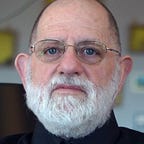Another Response to John Smith’s essay: “Free Will is an Illusion”
I agree with John Smith’s contention that free will is an illusion — in the sense that he defines an illusion as something which is not what it appears to be.
My theory, “Wholistic Existential Anthropology” (see two previous essays) could be summarized as an attempt to show that what people think of as reality is an illusion — in the sense that —
“Reality is not what it appears to be”.
Also, “The distinction between the physical and the mental (or the body and the mind) is not what it appears to be.
Also, “What we mean when we use the word “causality” is not what it appears to be”.
Also, “What we mean by “meaning” is not what it appears to be”
Also, “the distinction between “reality and appearance” is not what it appears to be.
As John Smith suggests in his scintillating essay, language plays an essential role in our thinking and perception, and, from a certain point of view, is always in the way of “things” being anything other than different from what they appear, since how they appear to “us” (and let us not forget that there are many different Uses) is always mediated in and by and through language (or words).
It is only Human Beings who can make a distinction between what is real and what is an illusion, or what we might think something is and what it “really” is. And we only make this distinction by some kind of mental process which we can call thinking, and which is highly language dependent.
“Reality” is a concept, not a thing, and only human beings have concepts. If you ask people the question: “What is real?” the answers will certainly be very diverse, revealing differences even in what they think the question means)/ This is likely to be true even if one only considers speakers of English. Ask people in the United States who are native speakers of English what is “real”. Ask 5 four year-olds, ask 5 high school students, ask 5 farmers, ask 5 college students, ask 5 people who work on garbage trucks, ask 5 physicists, ask 5 psychologists, ask 5 philosophers, etc..
There might be some convergence around the idea that what is real is physical or material — what can be touched or seen. John Smith, just as I do, does not think that what is immaterial, like “thoughts” are unreal, but he grapples with the question of how can something immaterial effect something material. His ideas about how one might resolve this conundrum are interesting, and he refers to previous philosophers (like Descartes) who have engaged in this effort.
One step in my own efforts to find a useful solution to the problem is to suggest that it is an illusion to think that “the mind” and “the body” are separate in an “objective” sense. All of reality is a unity (wholistic) and only Human thinking makes distinctions like “mind” and “body”. It is “useful” (also an abstract concept that is thinking-dependent and language-dependent) to make this distinction for certain purposes — very useful — but, in my view, the separateness does not exist independent of human Minding or thinking. So the question of how does the mind influence (or in some instances “control”) the body is itself a conceptual problem (which is not to say that it is not a “real” problem, but rather to suggest that the nature of the problem itself is not as it usually appears to most people most of the time).
It may be noted, that referencing Descartes, as John Smith does, I would say “I experience, therefore I exist” and “I experience and reality has extancy”. Also, note that as I understand him, Emanuel Kant considers “causality” as a quality of the human mind or a category of human thinking, not as independently extant in some objective, material “reality”. I agree. I wonder if John Smith does.
I have been working on a third essay which attempts to offer suggestions as to how to usefully think about the relationships between the three worlds of reality proposed within “Wholistic Existential Anthropology”. This attempt has proved to be very challenging, in fact, in relation to the very issue that John Smith addresses in his essay. He has inspired me to go on with my efforts with the added necessity to try to include the challenge that his proposal for resolving the problem of the interaction between Mind and Body presents (his correlates of protons and electrons that always mirror mental states like “will” or choosing). I am grateful for the stimulation.
